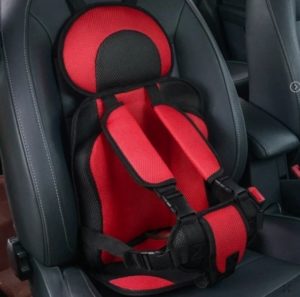Unsafe products that don’t meet FMVSS 213 are a problem today. These products are being sold to caregivers in the U.S., often through online vendors. CPSTs must learn how to determine whether a car seat is legitimate and teach caregivers how to shop safely. When suspicious products are spotted, they should be reported so that authorities know a problem exists and can respond. The following resources can be used to help.
Report unsafe car seats and related products:
Have you seen a non-compliant product? Report it to these governmental agencies. They need to hear from caregivers and CPSTs to know what’s going on in the field.
- NHTSA—Tell NHTSA anytime you see an unsafe/defective/non-compliant car seat or related product by using this form: https://www-odi.nhtsa.dot.gov/VehicleComplaint or Toll-Free: 1-888-327-4236 / Hearing Impaired (TTY): 1-800-424-9153 (FYI, the form has been updated to allow people to complete a complaint, even if the car seat is from an unknown or unestablished brand. Just enter/select “unknown” for car seat brand.)
- Consumer Product Safety Commission—Alert this agency, as well, if a RF-only car seat’s required carrier labels are missing: www.SaferProducts.gov, or call CPSC’s toll-free Hotline at (800) 638-2772
- U.S. Department of Commerce— If a counterfeit car seat is spotted, contact this agency. Do this in addition to reporting to NHTSA (above). At the following website, under Contact Us you can send an email to describe the problem. Be sure to collect as much information as possible (including photos, purchasing info, packing slips, etc.). An agent will follow up by getting in touch with you: www.stopfakes.gov
Alert the Public About Recalls of Unsafe Products
NHTSA recalls Marainbow AND “materially similar” products
Find the recall under JD E-Commerce America Limited on the current recall list. The product has also been sold under the name Joybuy Express. A link to an external list of alternate product names can be found here.

(This image depicts the style of the product named in the recall as well as others that are “materially similar,” although the make/model of the product shown is unknown.)
Share these resources with the public and CPSTs:
Doernbecher Children’s Hospital
Doernbecher Children’s Hospital has developed a two-page flyer which features side-by-side comparisons of fake and approved car seat features. This flyer is available in Amharic, Arabic, Creole, Russian, Spanish, Swahili, Tigrinya, and English.
Click here and select Car seats and car safety.
Maryland Kids in Safety Seats
Maryland KISS has developed a one-page sheet describing red flags that can alert people when a car seat is unsafe for use in the U.S. They’ve graciously made this one-page sheet available in two versions: one with their contact information and one that can be customized for your agency. You may choose either format of this flyer to share with techs or caregivers.
Car Seat Red Flags Car Seat Red Flags (customizable)
SafetyBeltSafe USA
SBS USA offers a free, 2-page flyer titled “Warning: Fake and Unsafe Products” in both English and Spanish. Find it at www.carseat.org (sheet #680). Also related is Sheet #606, which describes the risks of belt-positioning devices.
Click-It Utah
Click-It Utah has produced two short video clips featuring twins side-by-side, one in a compliant car seat and one in a fake. Each highlights a basic counterfeit “tell” to watch out for. Find the videos at https://clickit.utah.gov/cps-technicians (scroll down to Counterfeit Car Seats).
Read information for CPSTs:
Manufacturers Alliance for CPS
The MACPS has a fact sheet titled “How to Determine That a Child Restraint System Can Be Used Legally in the U.S.” on its webpage. Navigate to it on this site, or click the button below.
Find it here
Safe Ride News
SRN article titled “Calling Out Fakes, Knock Offs, and Imposters!”:
Read the article
SRN article titled “Warning: Aftermarket LATCH=Fake LATCH!”:
Read the article
Watch this webinar to learn more:
CPS Board
At www.cpsboard.org (under Recertification), a webinar titled “How to Know if a Car Seat Is Legit—or Not!” covers the topic of fake car seats in more depth. Presenters include Denise Donaldson (SRN), Sarah Haverstick (Goodbaby), Jennifer Rubin (SK Greater Sacramento), and Dr. Beth Woolfe (NHTSA). Note: By first logging into your CPS Board account (or creating an account, if necessary), a quiz can be taken after this webinar to earn 1.5 CEUs toward CPST recertification.
Watch it here
